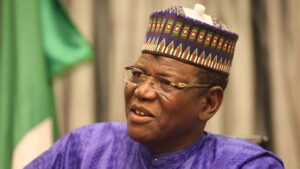A prominent former governor of Jigawa State, Lamido has dismissed the acclaimed reputation of President Bola Tinubu as the architect behind the development of modern Lagos State.
Instead, he criticized Tinubu’s performance at the federal level, highlighting the government’s failure to effectively address various issues.
Tinubu, who served as governor of Lagos State from 1999 to 2007, has been credited by his supporters for laying the groundwork for the transformation of Lagos into a modern city.
However, the former governor, who is a member of the main opposition Peoples Democratic Party (PDP), argued that Lagos, being a former Nigerian capital before the seat of government was moved to Abuja, already enjoyed significant presence and investment from the Federal Government.
Recalling his knowledge of Tinubu’s political career from his days in the Social Democratic Party (SDP) to his tenure as governor, the former governor expressed doubts about Tinubu’s actual contributions to the development of Lagos.
He asserted that Lagos was primarily developed using funds from the Nigerian government, including investments in the port, airport, and bridges. Therefore, attributing the development solely to Tinubu would be inaccurate.

Shifting focus to the present government, led by President Tinubu since May 2023, the former governor criticized the administration’s policies and reforms.
Specifically, he highlighted the removal of fuel subsidy and the floating of the naira, which have resulted in a significant increase in petrol prices, a rise in the cost of living, and soaring inflation rates, reaching 33.6% in April 2024.
Expressing discontent with the government’s performance, the former governor labeled their approach as flawed and criticized their management of key projects.
He specifically mentioned the Lagos-Calabar coastal road project, questioning its prioritization over the urgent demand for a new minimum wage by organized labor.
According to him, with proper resource management and the implementation of such infrastructure projects, Nigeria could easily afford a higher minimum wage.
In conclusion, the former governor emphasized his skepticism regarding Tinubu’s role in building Lagos and expressed disappointment with the current government’s policies and project priorities.
He strongly believed that better management of resources could lead to the fulfillment of labor demands and the overall improvement of the country’s economic situation.




